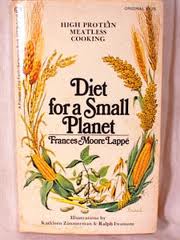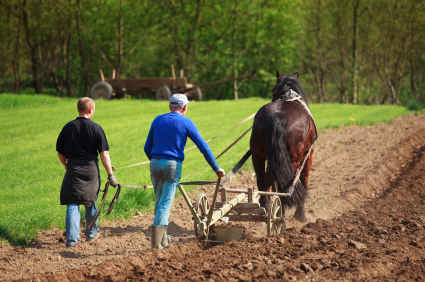Genetically Modified Food Can Feed The Planet
By admin on December 26, 2012
 The publication of “Diet for a Small Planet” in 1971 by Francis Moore Lappé was a conscious-raising event for many Americans. The book makes the case that grain-fed meat production is wasteful and a contributor to global food scarcity. The author argues that eating a planet-centered diet means choosing what is best for the Earth and our bodies – a daily action that reminds us of our power to create a more rational world. The book’s most significant conclusion is that world hunger is not caused by a lack of food but by ineffective food policy. A vegetarian diet can produce sufficient protein for one’s nutrition, according to the book.
The publication of “Diet for a Small Planet” in 1971 by Francis Moore Lappé was a conscious-raising event for many Americans. The book makes the case that grain-fed meat production is wasteful and a contributor to global food scarcity. The author argues that eating a planet-centered diet means choosing what is best for the Earth and our bodies – a daily action that reminds us of our power to create a more rational world. The book’s most significant conclusion is that world hunger is not caused by a lack of food but by ineffective food policy. A vegetarian diet can produce sufficient protein for one’s nutrition, according to the book.
Fast forward some forty years to today. The organic food movement has transformed the way many Americans think about food and has had a significant impact on food shopping. Organic food has become a multi-billion dollar industry with significant influence in education and public policy, and on law makers. We have certainly become more educated consumers by understanding how food products are manufactured and processed, which is an important part of the organic food industry’s message. But as Business Week put it, the organic food industry is a "far cry from the old food co-ops, wheatgrass, tofu, and alfalfa sprouts options, organic food and the industry supporting it has grown up".
There is a certain romanticism about the organic farming, which leads some to ask why can’t we just go back to the way we farmed in the 19th century? From a societal standpoint, what are the pros and cons of organic food vs. “genetically modified” food? How can we differentiate between the myths about the food we eat and the facts? In an article in the Wall Street Journal on December 24, 2012, John R. Block, the former secretary of the Department of Agriculture (1981-1985) tackles this issue head on.
just go back to the way we farmed in the 19th century? From a societal standpoint, what are the pros and cons of organic food vs. “genetically modified” food? How can we differentiate between the myths about the food we eat and the facts? In an article in the Wall Street Journal on December 24, 2012, John R. Block, the former secretary of the Department of Agriculture (1981-1985) tackles this issue head on.
Food Safety According to Mr. Block, there has never been a single instance in which genetically modified food has caused an illness or contributed to a contaminated product. Nevertheless, you can open a newspaper or a website on any given day and be barraged by scientific-sounding warnings that gene-altered substances can enter our bodies and wreak genetic havoc. One such article is titled, "Is Genetically Modified Food Killing Us?" or another simply "Genetic Roulette".
In fact, America’s farmers and ranchers have built a sophisticated food-safety infrastructure to improve the health of their animals and deliver fresh, clean produce. There is no evidence that organic food is “better for you” from a safety perspective. As a result of the use of biotechnology in agriculture, genetically modified crops taste better, take less time to mature, provide increased nutrients, yields and stress tolerance, and have improved resistance to disease, pests, and herbicides. According to the Human Genome Project, on the horizon are bananas that produce human vaccines against infectious diseases such as hepatitis B and cows that are resistant to Mad Cow Disease.
Crops from biotech seeds are identical to those from non-biotech seeds. In addition, organic foods are identical in nutritional value to non-organic foods. Numerous studies have shown no nutritional difference between commercially available GMO (short hand for "genetically modified organisms") and non-GMO foods.
Food Choices Not that long ago, what Americans ate depended on the farmer’s skill, the weather and other unpredictable variables. Pre-industrial agricultural yields were low before the introduction of machines, fertilizers, plant and animal breeding, pesticides and genetic engineering. We are no longer limited to a small variety of local and seasonal food. Modern agriculture is simply more productive, providing more variety at lower prices. As romantic as it would be to only eat food grown on a farm where two horses pulled a two-row corn planter, it probably wouldn’t feed the world’s population for all that long.
 Environmental Stewardship Today’s farmers use agricultural practices that improve the sustainability of the land and limits the use of herbicides, pesticides and fertilizers. The goal of the much of the research into genetically engineered crops is higher yield with less water and chemical use.
Environmental Stewardship Today’s farmers use agricultural practices that improve the sustainability of the land and limits the use of herbicides, pesticides and fertilizers. The goal of the much of the research into genetically engineered crops is higher yield with less water and chemical use.
Sustainability Most significantly, the large scale sophisticated farming of today is better equipped to sustain the world’s growing population.
According to Mr. Block, America’s farmers grow five times as much corn as they did in the 1930’s on 20% less land. To meet the goal of helping to feed a global population of what the United Nations estimates will be eight billion people in 2030, our farmers and ranchers will have to use the latest and most effective technologies to produce more with less.
I support organic and conventional farming. I love shopping at Whole Foods. I shop at every Farmer’s Market I come across. Thanks to the organic farming movement, our collective consciousness about food has been heightened. However, a higher consciousness alone cannot meet the world’s food demands. The underlying assumptions are different than they were forty years ago, but the basic premise holds true today. Effective food policy remains the key to feeding the planet. A strong first step in developing effective food policy is separating fact from fiction when it comes to biotechnology and American agriculture.
